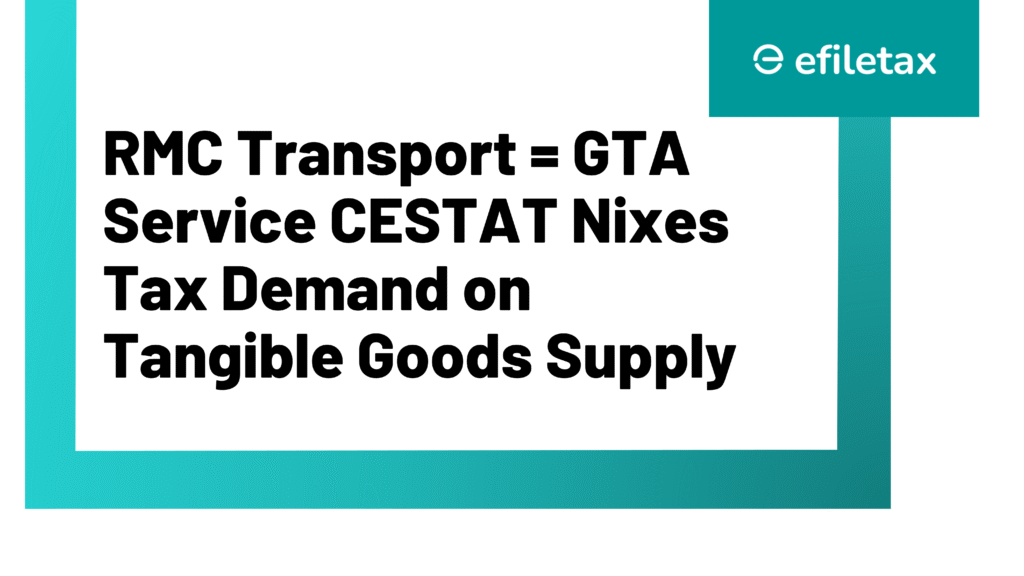
RMC Transportation Is GTA Service, Not Supply of Tangible Goods: CESTAT
In a significant win for the construction and logistics sectors, the CESTAT Ahmedabad Bench has ruled that the transportation of Ready Mix Concrete (RMC) qualifies as Goods Transport Agency (GTA) service under service tax, and not as “supply of tangible goods”. This classification has important implications for GST and legacy tax demands, especially in ongoing litigations.
👉 Focus Keyphrase: RMC transportation is GTA service
What Was the Case About?
The case involved Prism Johnson Ltd, which transported RMC using its own transit mixers to construction sites. The Revenue alleged that this amounted to supply of tangible goods and demanded service tax under that category.
However, CESTAT Ahmedabad held otherwise in Order No. Final/100000/2024 dated 01.01.2024.
Key Observations by CESTAT
- Control Remains with Owner: The transit mixers were operated by Prism Johnson’s own drivers. Hence, no transfer of control or possession of the vehicle happened.
- Service Was Transportation of Goods: Since the service was limited to carrying RMC to client sites, it fits the definition of GTA service, not tangible goods supply.
- CBEC Clarification Supported View: As per CBEC Circular No. B1/6/2005-TRU dated 27.07.2005, the transfer of possession and right to use are key to taxable “tangible goods” service. These were absent in this case.
Why This Ruling Matters
- ✅ Lower Tax Burden: GTA services qualify for abatement and reverse charge, reducing tax liability for service providers.
- ✅ Applicable to GST Regime Too: Though this was a service tax era case, similar principles apply under GST (Notification No. 13/2017-CT(Rate) for RCM on GTA).
- ✅ Useful Precedent: Builders, RMC suppliers, and fleet operators can leverage this judgment to defend similar claims by GST officers.
Legal Reference Snapshot
| Aspect | Ruling Highlights |
|---|---|
| Law Invoked | Section 65(105)(zzzzj) of Finance Act, 1994 |
| Tribunal | CESTAT Ahmedabad |
| Case Name | Prism Johnson Ltd vs Commissioner of Central Excise |
| Key Circular | CBEC Circular B1/6/2005-TRU, dated 27.07.2005 |
| Judgment Date | 01 January 2024 |
Expert View: How Businesses Should React
“If you are in the business of delivering RMC using your own vehicles and drivers, this ruling can help you avoid incorrect tax classification, especially during departmental audits under GST,”
says Vignesh Raj, Indirect Tax Consultant at Efiletax.
How to Classify RMC Delivery in GST?
Under the GST regime:
- ✅ If you’re a registered GTA (issuing consignment notes), then RCM applies.
- ❌ If you’re merely using your own fleet for delivery and not issuing consignment notes, it may be outside GTA scope.
- 🧾 Always maintain documents to prove that the recipient does not control the vehicle.
FAQ: RMC Transportation Taxability
Q1. Is RMC delivery taxable under supply of tangible goods?
A: No, not if the recipient doesn’t gain control over the vehicle. It’s a GTA service.
Q2. What if no consignment note is issued?
A: Then it may not qualify as GTA. But it also cannot be taxed as supply of tangible goods unless there’s transfer of right to use.
Q3. Does this help under GST too?
A: Yes. While the ruling is from the service tax era, the core logic applies to GST disputes as well.
Summary
CESTAT ruled that RMC transportation using own vehicles is GTA service, not supply of tangible goods. No service tax demand can be raised under the latter. The judgment helps builders and transporters in GST audits where misclassification may lead to heavy tax liabilities.
Final Thoughts
This landmark decision protects RMC suppliers and logistics operators from misclassification under legacy service tax laws — and offers a defensible ground under GST too.